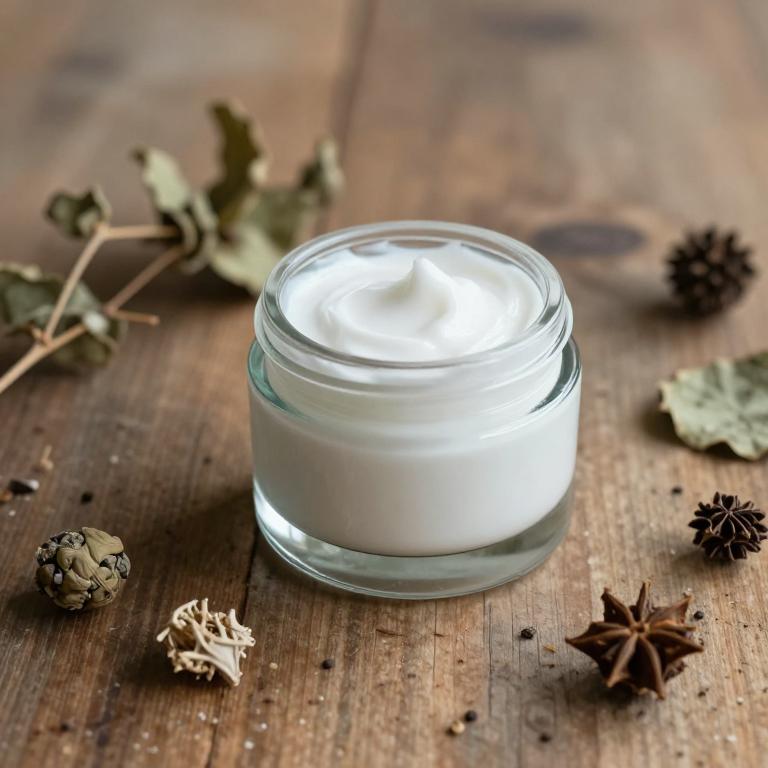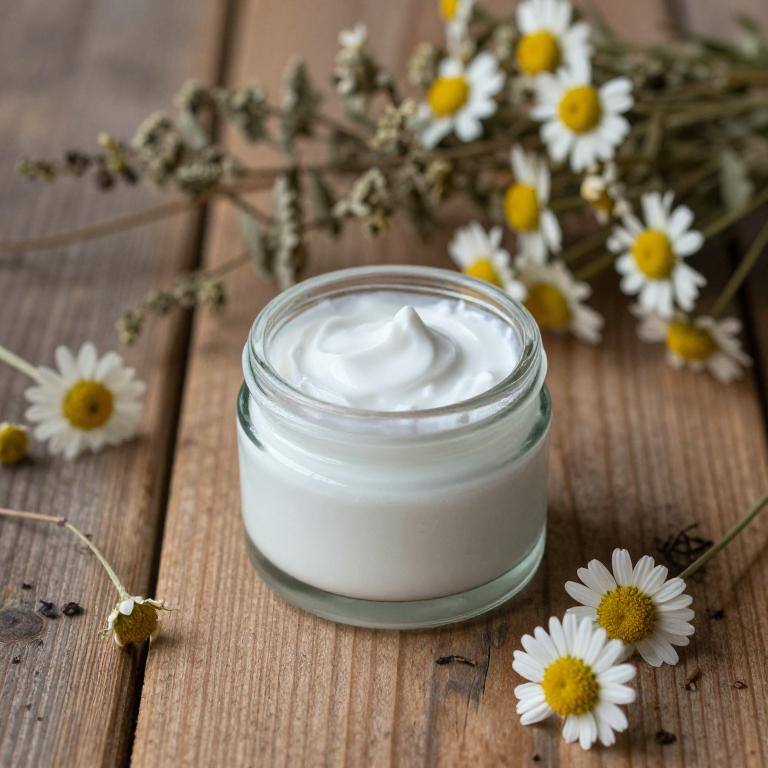10 Best Herbal Creams For Oily Skin

Herbal creams for oily skin are formulated with natural ingredients that help regulate sebum production and reduce excess oiliness.
These creams often contain ingredients like neem, aloe vera, and green tea, which have antibacterial and anti-inflammatory properties. They are ideal for individuals with acne-prone or combination skin, as they help to balance oil without clogging pores. Unlike traditional creams, herbal formulations are typically lightweight and non-comedogenic, making them suitable for daily use.
Regular application of these creams can improve skin texture and reduce the appearance of blemishes while promoting a healthier, more radiant complexion.
Table of Contents
- 1. Aloe vera (Aloe barbadensis)
- 2. St. john's wort (Hypericum perforatum)
- 3. Centella (Centella asiatica)
- 4. Dog rose (Rosa canina)
- 5. Salvia (Salvia officinalis)
- 6. Ginger (Zingiber officinale)
- 7. Chaste tree (Vitex agnus-castus)
- 8. German chamomile (Chamomilla recutita)
- 9. English lavender (Lavandula angustifolia)
- 10. Rosemary (Rosmarinus officinalis)
1. Aloe vera (Aloe barbadensis)

Aloe barbadensis, commonly known as aloe vera, is a popular ingredient in herbal creams designed for oily skin due to its soothing and moisturizing properties.
These creams help regulate sebum production, reducing excess oiliness without stripping the skin of its natural moisture. Aloe vera contains anti-inflammatory compounds that can calm redness and irritation often associated with oily skin types. Its natural antioxidants also protect the skin from environmental stressors while promoting a clearer complexion.
Overall, aloe barbadensis herbal creams offer a gentle, effective solution for maintaining balanced, healthy skin in individuals with oily skin concerns.
2. St. john's wort (Hypericum perforatum)

Hypericum perforatum, commonly known as St. John's wort, is often used in herbal creams formulated for oily skin due to its anti-inflammatory and antimicrobial properties.
These creams can help reduce excess sebum production and minimize the appearance of blemishes, making them beneficial for those with acne-prone skin. The active compounds in St. John's wort, such as hypericin and flavonoids, may also provide soothing effects on irritated skin. However, individuals with oily skin should use these creams cautiously, as some formulations may contain ingredients that could further clog pores.
It is advisable to consult a dermatologist before incorporating St. John's wort creams into a skincare routine to ensure they are suitable for one's specific skin type.
3. Centella (Centella asiatica)

Centella asiatica, also known as gotu kola, is a popular herb used in natural skincare for its soothing and healing properties.
Centella asiatica herbal creams are particularly beneficial for oily skin due to their ability to regulate sebum production and reduce excess oiliness. These creams often contain extracts that help calm inflammation and prevent breakouts, making them ideal for those with acne-prone skin. Additionally, they are generally non-comedogenic, meaning they won't clog pores, which is crucial for maintaining clear skin.
Regular use of centella asiatica herbal creams can improve skin texture and promote a more balanced, radiant complexion.
4. Dog rose (Rosa canina)

Rosa canina, also known as rose hip, is a natural ingredient commonly used in herbal creams for its nourishing and rejuvenating properties.
These creams are particularly beneficial for oily skin due to their ability to regulate sebum production and prevent excess oiliness. The high concentration of essential fatty acids and antioxidants in rosa canina helps to reduce inflammation and promote skin healing without clogging pores. Regular use of rosa canina herbal creams can lead to a more balanced complexion and improved skin texture.
Additionally, these creams are often formulated with gentle, non-comedogenic ingredients, making them suitable for daily use on sensitive or acne-prone skin.
5. Salvia (Salvia officinalis)

Salvia officinalis, commonly known as sage, is a versatile herb that has been used for centuries in traditional medicine and skincare.
When incorporated into herbal creams, salvia officinalis can offer numerous benefits for oily skin due to its astringent and anti-inflammatory properties. These creams help to regulate sebum production, reduce excess oiliness, and minimize the appearance of pores. The natural compounds in sage, such as rosmarinic acid and flavonoids, also have antimicrobial effects that can help prevent acne breakouts.
Overall, salvia officinalis herbal creams provide a gentle yet effective solution for managing oily skin while promoting a balanced and healthy complexion.
6. Ginger (Zingiber officinale)

Zingiber officinale, commonly known as ginger, is a popular herbal ingredient used in the formulation of creams tailored for oily skin.
These creams leverage the natural anti-inflammatory and antimicrobial properties of ginger to help reduce excess sebum production and prevent acne breakouts. The warming effect of ginger can also help improve blood circulation, promoting a healthier skin texture and tone. Additionally, ginger-based creams often contain other natural ingredients like turmeric or neem, which further aid in balancing oil production and soothing skin irritation.
Overall, zingiber officinale herbal creams offer a natural and effective solution for individuals with oily skin seeking gentle yet potent skincare options.
7. Chaste tree (Vitex agnus-castus)

Vitex agnus-castus, also known as chasteberry, is a herbal ingredient often used in skincare products for its potential to regulate sebum production and balance skin oiliness.
Herbal creams containing vitex are particularly beneficial for individuals with oily skin, as they may help reduce excess oil without stripping the skin of its natural moisture. These creams are typically formulated with other soothing and anti-inflammatory ingredients to enhance their effectiveness and provide a calming effect on the skin. The use of vitex in skincare can support a more balanced complexion by addressing the underlying hormonal and hormonal-related factors that contribute to oily skin.
However, it is important to consult a dermatologist before incorporating new herbal products into a skincare routine, especially for those with sensitive or acne-prone skin.
8. German chamomile (Chamomilla recutita)

Chamomilla recutita, commonly known as German chamomile, is a popular herbal ingredient used in skincare products due to its soothing and anti-inflammatory properties.
When incorporated into creams for oily skin, chamomile helps to calm irritation and reduce redness without clogging pores. Its natural antibacterial properties can help manage acne-prone skin by preventing bacterial overgrowth. These creams often contain other complementary ingredients like aloe vera or green tea to enhance their calming effects.
Overall, chamomilla recutita herbal creams offer a gentle yet effective solution for those with oily skin seeking natural skincare options.
9. English lavender (Lavandula angustifolia)

Lavandula angustifolia, commonly known as English lavender, is often incorporated into herbal creams designed for oily skin due to its soothing and balancing properties.
These creams typically contain lavender essential oil, which has natural anti-inflammatory and antimicrobial benefits that can help regulate sebum production. The aromatic compounds in lavender also have a calming effect, making the creams not only effective but also pleasant to use. For individuals with oily skin, lavender-based creams can help reduce excess oil, minimize breakouts, and provide a refreshing, non-greasy finish.
Overall, lavender herbal creams offer a gentle yet potent solution for maintaining clear and balanced skin.
10. Rosemary (Rosmarinus officinalis)

Rosmarinus officinalis, commonly known as rosemary, is a versatile herb that has been widely used in natural skincare for its numerous benefits, especially for oily skin.
Rosemary herbal creams often contain essential oils and extracts that help regulate sebum production, reducing excess oiliness without stripping the skin of its natural moisture. These creams are typically rich in antioxidants and anti-inflammatory compounds, which can help soothe irritation and prevent breakouts. Due to its astringent properties, rosemary is effective in tightening pores and improving the overall texture of oily skin.
However, individuals with sensitive skin should perform a patch test before incorporating rosemary-based products into their skincare routine.